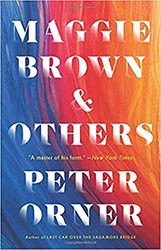Peter Orner returns to his beloved Chicago with a riveting, rule-breaking, genre-bending, and multi-textured new novel of generational ache, The Gossip Columnist’s Daughter.
The year is 1963. Days after JFK’s assassination, Karyn (a.k.a. Cookie) Kupcinet, the daughter of gossip columnist, local celebrity and yak-about-town, Irv Kupcinent, is found dead in her Hollywood apartment. A nepo baby, Cookie was a budding starlet, with addictions and angst to match. Spun in the press as a murder, the case remains unsolved, with more questions than answers.
Enter Jed Rosenthal, today. Struggling novelist, newly-separated father, and admitted “emotional procrastinator,” Jed becomes consumed with Cookie’s story — ostensibly for book research— decades after her death. But his is more than mere voyeuristic obsession; there’s a personal angle, too. His own grandparents, Lou and Babs, had been inseparable from Cookie’s folks, Irv and Essee, until a minor incident at Cookie’s funeral resulted in Jed’s grandparents suddenly being “dropped like old shoes.”
Through Jed’s lens of longing, the story unfolds. Is his rabbit hole hunger an indulgent diversion from his own necessary soul searching? Or is his deep dive into Cookie’s story (and by expansion, the Kupcinets’ story, his grandparents’ story, his Uncle Solly’s story, and the larger power-grabby story of Chicago) the portal through which he finally reckons with himself and his faltering marriage? Jed acknowledges, “I do believe there’s a difference between wallowing and trying to claw your way back in time.”
The Gossip Columnist’s Daughter is a beautiful, yearning book of “old hurts and sorrows.” As it moves between storylines, the novel explodes convention, building an epic narrative mosaic through archival photography, family lore, speculative and historical fiction, crime reports, and other meta elements, including a letter to Saul Bellow, thereby resisting easy categorization.
If Irv and Essee Kupcinet feel larger than life, there is an intentional elusiveness, an almost shadowy unknowability, to other characters. Jed admits, “I’m descended from a man who chose to remain on the periphery, and I like to believe, despite my chosen line of work, that I’ve inherited some of his preference for going unnoticed.” As he studies images of Cookie, he notes “There’s…. a vagueness in her eyes that allows whoever looks at her to make up their own story about who she is or might become.” Cookie and her whole attendant mythology become a sort of repository. What is anyone searching for in another person’s story if not themselves?
Jed’s search outward echoes inward. “Who knows where or when it went wrong, or even if it did? If we can’t pinpoint such a moment in our own lives, why should we be able to pinpoint it in anybody else’s?”
In typical Orner fashion, the story hums with quiet, unassuming truths. “All the nights, all the forgettable nights make up whatever time we’re granted, and if you think this is nothing, then life isn’t anything.”
But the comedic impulse is never far away, particularly when it’s aimed at Orner’s hometown: “Chicago Jews like to indulge in our connections to the Mob. Call it a point of ironical pride. We didn’t all used to be orthodontists in Deerfield.”
The director of creative writing at Dartmouth College, Orner playfully tucks in numerous craft nuggets. “Minor characters don’t know they’re minor. Doesn’t this apply to us all?” One gets the sense that this realization may have been what sunk Cookie, even as it buoys Jed toward repair.
Presented in short, punchy sections with lots of white space, The Gossip Columnist’s Daughter embraces gaps. The expansiveness of possibility lives in those gaps. That is the grace of a story that enchants as it bewilders, that continues to open instead of close. Generosity stems from loose stitching. Gaps are what say, Hey, reader, fellow minor character in the theater of life, there’s plenty of room for you here, too.
Sara Lippmann is the author of the novel Lech and the story collections Doll Palace and Jerks. She is co-editor of Smashing the Tablets: Radical Retellings of the Hebrew Bible and co-founder of the Writing Co-lab, an online teaching cooperative based in Brooklyn. Her new novel, Hidden River, will be published in 2026.





